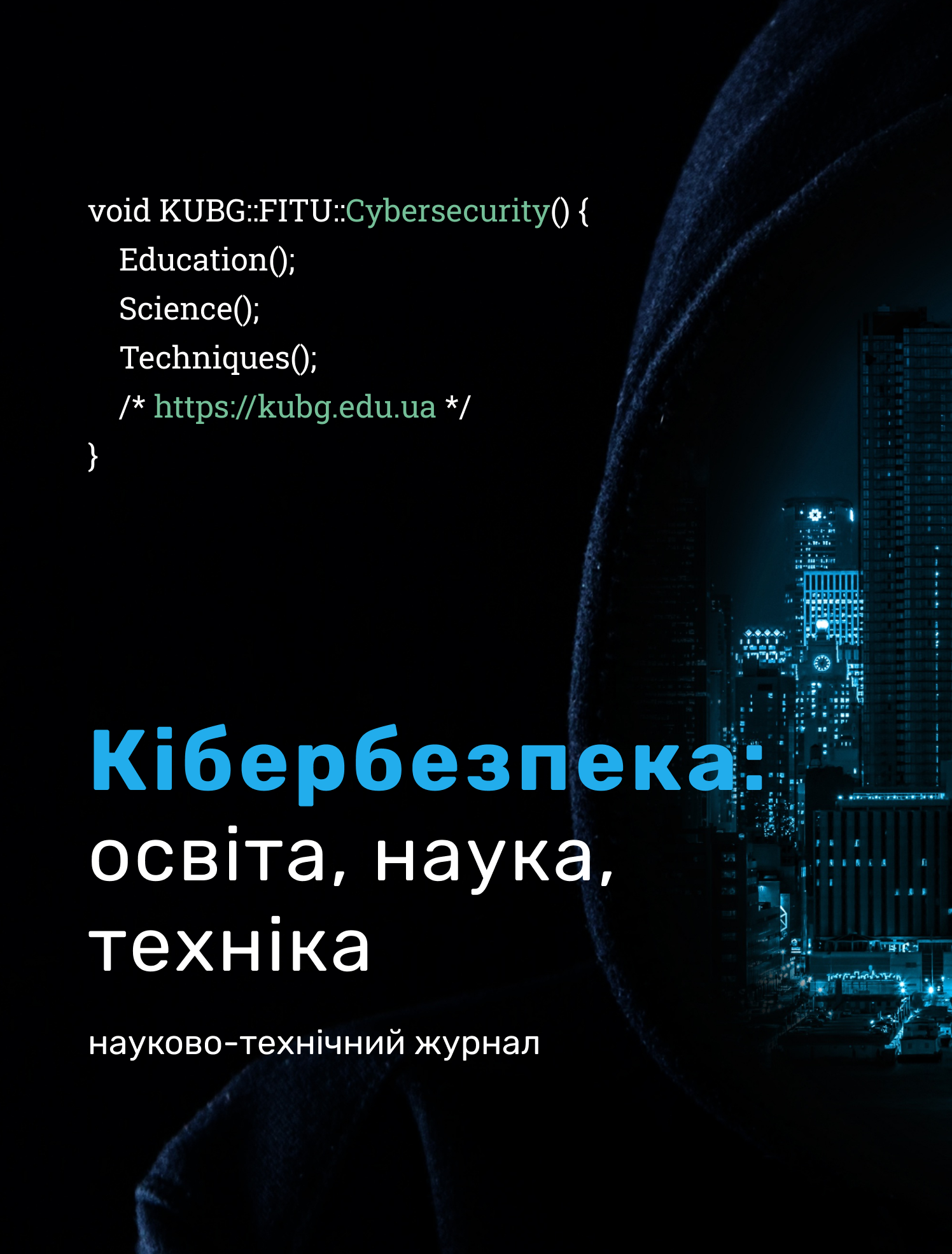METHOD FOR ADAPTING RECURSIVE SYSTEMATIC CONVOLUTIONAL CODES OF TURBO CODES BY BYPASSING THE NODES OF THE SPATIAL GRID
DOI:
https://doi.org/10.28925/2663-4023.2023.22.238248Keywords:
corrective codes; turbo codes; wireless data transmission systems; likelihood functions; adaptation.Abstract
The article is devoted to increasing the efficiency of the functioning of wireless information transmission systems due to the adaptation of the parameters of recursive systematic convolutional codes of turbo codes by bypassing the nodes of the spatial grid and calculating the objective function. The probability of a white error of information decoding is chosen as the objective function. To calculate the chosen probability of a white error of information decoding, it is proposed to use Bowes-Choudhury-Hockingham codes, since for turbo codes there are only approximate asymptotic characteristics that give a large error at small values of the signal-to-noise ratio. Analysis of known works shows that adaptation schemes of these codes are used to improve the reliability of information. At the same time, during adaptation, in the vast majority of works, only one parameter changes - the coding speed, which does not fully increase the effectiveness of corrective coding schemes. That is why it is proposed to use several parameters during adaptation, namely the polynomials of forward and backward connections of recursive systematic convolutional codes and the coding speed of turbo codes. The article consists of an introduction, which highlights the problem, analyzes the latest research and publications on this topic, and formulates the purpose of the article. The results of the research are shown, conclusions and prospects for further research are drawn. The article ends with a list of used sources. As a result of the work of the proposed method, the parameters of the turbo codes, which were found using the method for the channel with additive white Gaussian noise for different sizes of the input data block, are given. We consider the direction of further research to expand the space of the spatial lattice to take into account more parameters of turbo codes during adaptation, while the following can be foreseen: the number of bits in the block, types of interleavers, decoding algorithms, decoding iterations, etc.
Downloads
References
Lei, W., Soong, A. C. K., Jianghua, L., Yong, W., Classon, B., Xiao, W., Mazzarese, D., Yang, Z., & Saboorian, T. (2021). 5G system design: An end to end perspective (2nd ed.). Springer. https://doi.org/10.1007/978-3-030-22236-9
Neir, P. (2021). Securing 5G and evolving architectures. Addison-Wesley Professional.
Hassan, S., Orel, A., & Islam, K. (2022). A network architect's guide to 5G. Addison-Wesley Professional.
Jin, J., Xiao, C., Chen, W., & Wu, Y. (2019). Channel-statistics-based hybrid precoding for millimeter-wave MIMO systems with dynamic subarrays. IEEE Transactions on Communications, 67, 3991-4003. https://doi.org/10.1109/ACCESS.2020.3025181
Huang, H. (2020). Deep learning for physical-layer 5G wireless techniques: Opportunities, challenges, and solutions. IEEE Wireless Communications, 27, 214-222. https://doi.org/10.1109/MWC.2019.1900027
Shannon, C. E. (1948). A mathematical theory of communication. The Bell System Technical Journal, 27 (3), 379-423. https://doi.org/10.1002/j.1538-7305.1948.tb01338.x
Mensouri, M., & Aaround, A. (2016). Adaptive encoding/decoding for turbo codes. In Proceedings of the International Conference on Big Data and Advanced Wireless Technologies (BDAW`16) (pp. 1-7). https://doi.org/10.1145/3010089.3010096
Xie, C., El-Hajjar, M., & Xin Ng, S. (2023). Machine learning assisted adaptive LDPC coded system design and analysis. IET Communications, 18, 1-10. https://doi.org/10.1049/cmu2.12707
Berrou, C., Glavieux, A., & Thitimajshima, P. (1993, May). Near Shannon limit error-correcting coding and decoding: Turbo-codes. In Proceedings of the International Conference on Communications (ICC-93) (pp. 1064-1070). Geneva. https://doi.org/10.1109/ICC.1993.397441
Xiang-Gen, X. (2024). Understanding turbo codes: A signal processing study. Journal of Information and Intelligence, 2, 1-13. https://doi.org/10.1016/j.jiixd.2023.10.003
Published
How to Cite
Issue
Section
License
Copyright (c) 2023 Курбет Павло, Лілія Зайцева

This work is licensed under a Creative Commons Attribution-NonCommercial-ShareAlike 4.0 International License.




